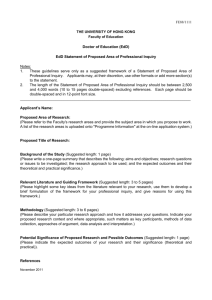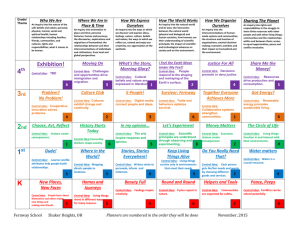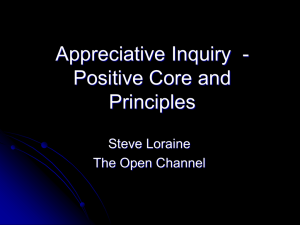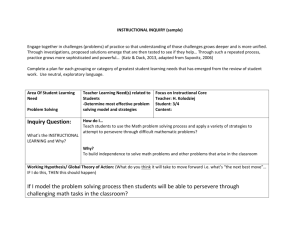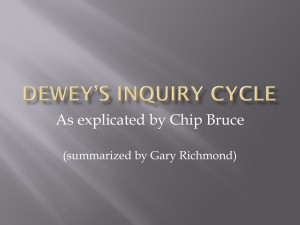Personal & Family Histories
advertisement
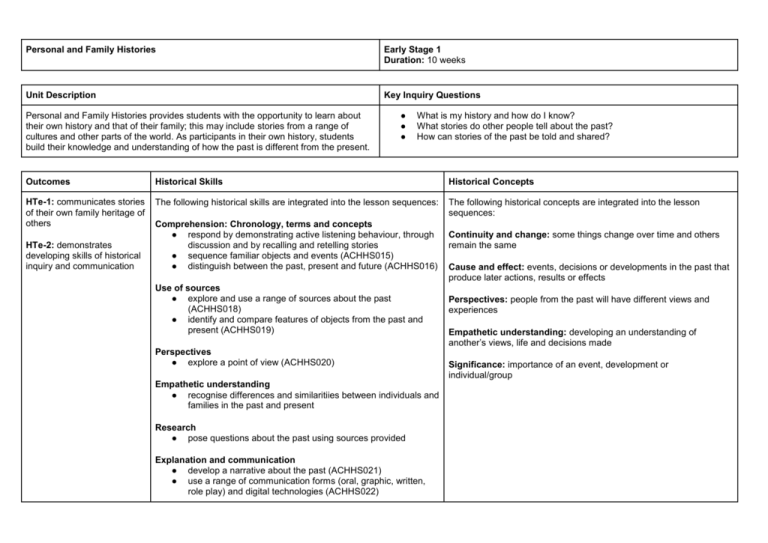
Personal and Family Histories Early Stage 1 Duration: 10 weeks Unit Description Key Inquiry Questions Personal and Family Histories provides students with the opportunity to learn about their own history and that of their family; this may include stories from a range of cultures and other parts of the world. As participants in their own history, students build their knowledge and understanding of how the past is different from the present. ● ● ● What is my history and how do I know? What stories do other people tell about the past? How can stories of the past be told and shared? Outcomes Historical Skills Historical Concepts HTe-1: communicates stories of their own family heritage of others The following historical skills are integrated into the lesson sequences: The following historical concepts are integrated into the lesson sequences: HTe-2: demonstrates developing skills of historical inquiry and communication Comprehension: Chronology, terms and concepts ● respond by demonstrating active listening behaviour, through discussion and by recalling and retelling stories ● sequence familiar objects and events (ACHHS015) ● distinguish between the past, present and future (ACHHS016) Use of sources ● explore and use a range of sources about the past (ACHHS018) ● identify and compare features of objects from the past and present (ACHHS019) Perspectives ● explore a point of view (ACHHS020) Empathetic understanding ● recognise differences and similaritiies between individuals and families in the past and present Research ● pose questions about the past using sources provided Explanation and communication ● develop a narrative about the past (ACHHS021) ● use a range of communication forms (oral, graphic, written, role play) and digital technologies (ACHHS022) Continuity and change: some things change over time and others remain the same Cause and effect: events, decisions or developments in the past that produce later actions, results or effects Perspectives: people from the past will have different views and experiences Empathetic understanding: developing an understanding of another’s views, life and decisions made Significance: importance of an event, development or individual/group Content Teaching, Learning and Assessment Who the people in their family are, where they were born and raised and how they are related to each other. (ACHHK001) Historical Knowledge Historical Inquiry Topics My Family: ● The composition of the family; where people within it were born and raised; how they relate to each other; the different generations Who are the members of my family? How are my relatives connected to each other? Where were members of my family born? How stories of families and the past can be communicated, for example through photographs, artefacts, books, oral histories, digital media and museums (ACHHK004) Historical Knowledge Historical Inquiry Topics My family’s history: ● Personal and family stories of the past; family artefacts How are stories from the past communicated? (eg: oral storytelling, rock paintings, photos) What stories does my family tell about the past? What ‘treasures’ does my family have? (eg: photos, medals, old toys) The different structures of families and family groups today and what they have in common. (ACHHK002) Historical Knowledge Historical Inquiry Topics Other people’s families: ● Different family structures; similarities and differences with other families including from other countries What different kinds of families are there? How are families from other cultures similar or different from my family? How they, their family and friends commemorate past events that are important to them. (ACHHK003) Resources Historical Knowledge Historical Inquiry Topics Family celebrations: ● Events that families remember and celebrate ● How past events are commemorated What events does my family celebrate? (eg: birthdays, anniversaries) How does my family honour important occasions? (eg: ANZAC Day, religious festivals, Welcome to Country ceremonies)


